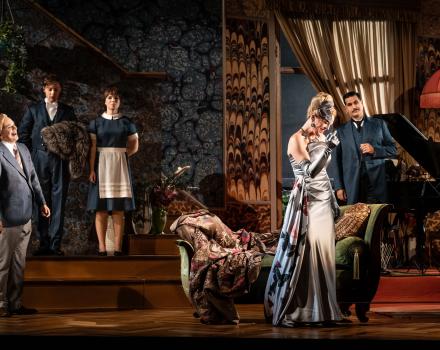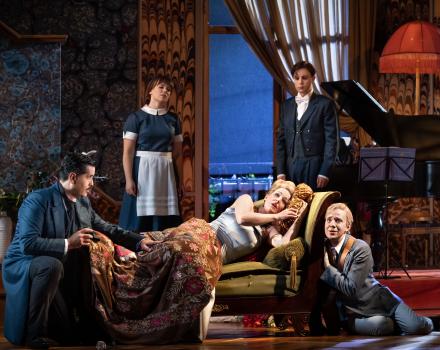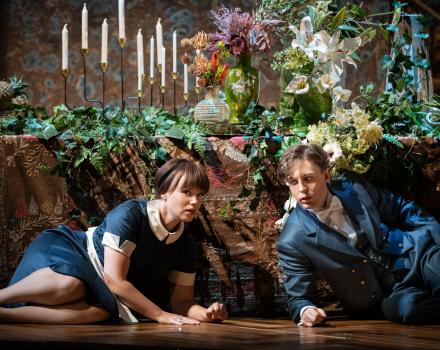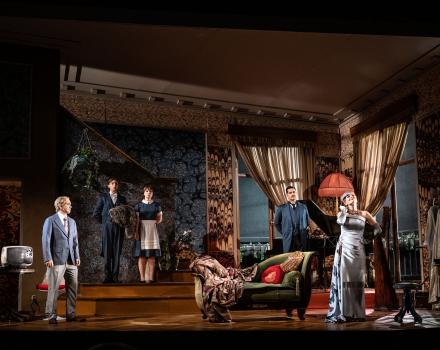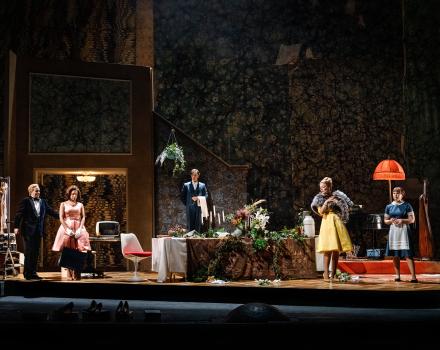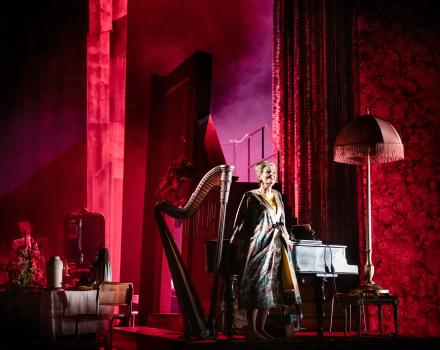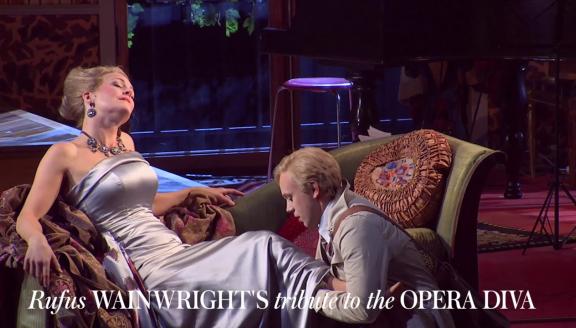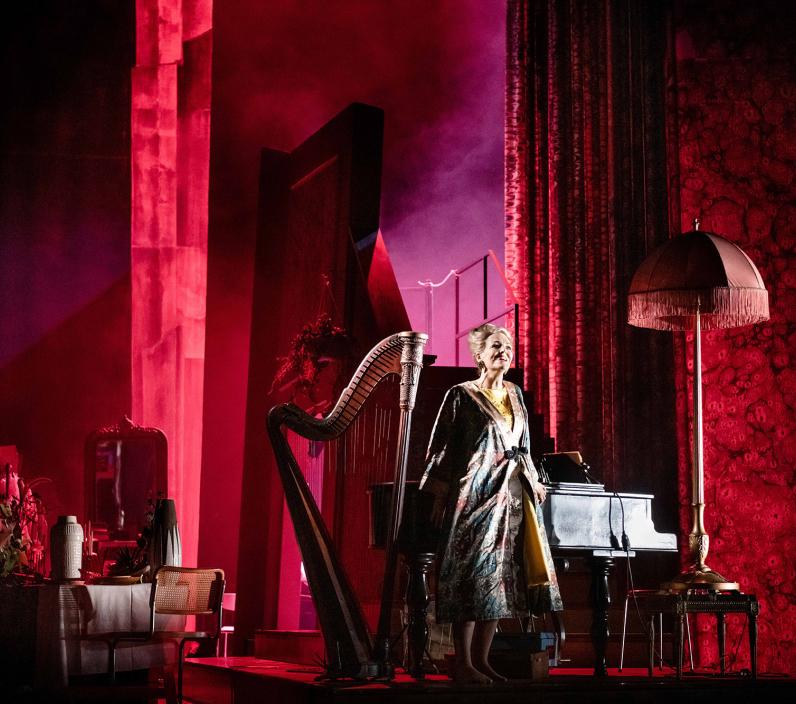

Prima Donna
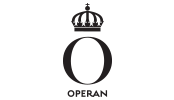
After interrupting her career following a traumatic performance of an opera written especially for her, an aging singer is now preparing for her return. Will this woman torn between a dream of the stage and a dream of love be able to achieve her goal?
Written as a tribute to Romantic opera, Prima Donna is the first venture into opera by Rufus Wainwright, better known for his career in pop. Here we discover a self-destructive diva, inspired by Maria Callas. There is something ridiculous about the faded star, but through our admiration she will shine forever.
Cast
|
Régine Saint Laurent
|
Elin Rombo
|
|---|---|
|
Marie
|
Beate Mordal
|
|
Philippe
|
Jeremy Carpenter
|
|
André Letourner
|
Conny Thimander
|
|
François
|
Ruben Lundström
|
|
Sophie von Faninal
|
Nadja Sjöström
|
|
Orchestra
|
Royal Swedish Orchestra
|
| ... | |
|
Music
|
Rufus Wainwright
|
|---|---|
|
Conductor
|
Jayce Ogren
|
|
Director
|
Mårten Forslund
|
|
Sets
|
Sabine Theunissen
|
|
Lighting
|
Linus Fellbom
|
|
Text
|
Rufus Wainwright & Bernadette Colomine
|
|
Concertmaster
|
Anders K Nilsson
|
|
Costume & Make up
|
Jeanette Stener
|
| ... | |
Video
The story
Act I
Early morning in Régine Saint Laurent’s Paris apartment. It is July 14 – the national day of France.
Régine (La Prima Donna) wakes up after a troubled night’s sleep. Her new maid, Marie, speaks to her about her drunken, violent husband while Régine agonizes over returning to the stage after a six-year-long break. She speaks of the role of her life, as Aliénor, the strong and powerful Queen of France and England, in an opera written for her when she was at the peak of her career.
Régine’s butler, Philippe, enters with his assistant François. It upsets Philippe to see Régine and Marie together when Régine should be preparing for an interview with a journalist, which has escaped her mind. After Philippe has sent Régine off to get changed, François helps him to prepare for the meeting. Philippe becomes nostalgic for the old days of splendour and fame, now only a distant memory.
The sound of the doorbell announces the arrival of the journalist, André Letourneur. Régine makes a flamboyant entrance.
Régine becomes emotional when André asks her about Aliénor d’Aquitaine, her very last performance. André sees more than the legend he has admired ever since he studied to become a tenor at the conservatory. He urges her to resume her singing career. She sits at the piano and together they sing the iconic lovers’ duet from Aliénor d’Aquitaine. When they reach the passionate climax Régine’s voice breaks.
Philippe intervenes, and they all agree that Régine needs a rest. André says he will return later that evening.
An unexpected moment occurs between Régine and André witnessed by Marie who has lingered in the room. With unease, she notices how Régine is filled with new hope for the future.
Act II
Evening
Preparations for the national day celebrations are underway. Marie sings of the simple life at home in Picardy. She compares the naivety of youth with the hectic and materialistic life in Paris.
As Régine warms up she tries to understand what went wrong during the interview. When she is on her own, she can reach that coveted high note, but each time she tries to find a deeper meaning and attempts to express it she fails. In order to be able to sing Aliénor, or any other role, ever again, she will need to listen to a recording she has never dared to hear. She thinks about what has been as she grapples with her low confidence and her nerves.
Finally, as she listens to the legendary recording, she is transported back in time to when she performed the lovers’ duet for the first time.
King Henry II of England from Aliénor d’Aquitaine enters the garden in the shape of André and declares his love for the queen. Régine becomes Aliénor and performs the magic scene to perfection. Then Régine wakes up from her reveries, realizing that she cannot repeat her earlier success and that she will never again return to the stage.
Philippe’s world falls apart, and he decides to vanish from Régine’s life just as the doorbell announces the journalist’s return.
André delivers an unwelcome surprise: he is engaged to be married, and he has brought his fiancée along. André asks Régine for a final favour: could she please sign his copy of Aliénor d’Aquitaine?
La Prima Donna signs her last autograph, then she steps out on the balcony alone as the July 14 fireworks light up the sky.
Insights
A star in free fall
The prima donna, the diva, the worshipped star. In all times, she has been strongly connected with the performing arts and music, both as an artist and performer and as a fictional character. As an audience, we are attracted by her starlight, by the perfection in expression, by her supernatural abilities. But we are also fascinated by the height of the fall from her pedestal, captivated by the sacrifices she has had to make and by the price she has paid. The prima donna is a role she has been gifted and been forced into, and around her is a fixed cast of supporting actors: the devoted fans and detractors, colleagues and managers, reviewers and agents who all have their role to play in the spectacle that upholds the idea of the exalted star.
In Rufus Wainwright's opera Prima Donna, we get to experience his fascination with the diva, the function she has in our lives as an icon, hero, role model, comfort and inspiration. We also get to see the world from her perspective, how she is forced to live up to the ever-growing expectations she has imposed on herself and on the real and imagined expectations that others have placed on her. We meet her in a series of situations surrounded by people who act out absurd hierarchies and established structures and who in turn try to live up to their assigned roles.
Our prima donna, Régine Saint Laurent, is a star in free fall. Her life has revolved entirely around opera: all she can and wants is to practice her art. Singing and theatre are her whole identity. When it is taken away from her, she loses everything. Many of us can all too well recognize ourselves in her fate, not least during the pandemic that has hit the world where so many people's opportunities for work and human contact have been snatched away, and with it a large part of our identity.
For Régine, expectations become a prison and the lost identity a black hole. But somewhere in the chaos, she senses an opportunity to break free from her role, sees a light shining through a thick curtain. And her act of resistance creates a chain reaction where the theatre is allowed to crack.
Here, the diva's situation becomes a mirror to discover ourselves in, and a role model for shaping our own identity. To create a role that can be the hero in its own drama.
Perhaps that explains why for so many of us she is a patron saint and an icon. She is both a victim and a hero, a human being and a goddess. And, like all of us, she is a little bit larger than life.
Mårten Forslund, director
Gallery
